Caryn’s Thoughts

 Babies are always so much fun, and that is what my great grand-niece, Reece Balcerzak is about to find out, as she gets ready to meet her new little brother, Aysa Bruce Bowen Balcerzak, who made his appearance on November 8, 2021. Aysa weighed 7 pounds 5 ounces, and he was 19 inches long. Aysa was a little more cooperative than his big sister, in that he only arrived Just over two weeks early, while his big sister arrived just over two months early, after her mom and dad stayed at Presbyterian Saint Luke’s Hospital in Denver for two weeks trying to buy a little bit of time for baby Reece. Then she had to be in the hospital in Denver for the next 60 days before she was big enough and healthy enough to go home. With the problems his big sister had, Aysa’s parents were a little apprehensive when they found out they were pregnant again. They had just about decided that they would a “one and done,” as little Aysa’s daddy, Keifer Balcerzak said, when Aysa’s mom, Katie Balcerzak told his daddy that she was pregnant. They were excited, but also a little worried that they would have a repeat of their daughter’s birth. In the end, Aysa wasn’t in quite as big a hurry to get here as his sister was…thankfully.
Babies are always so much fun, and that is what my great grand-niece, Reece Balcerzak is about to find out, as she gets ready to meet her new little brother, Aysa Bruce Bowen Balcerzak, who made his appearance on November 8, 2021. Aysa weighed 7 pounds 5 ounces, and he was 19 inches long. Aysa was a little more cooperative than his big sister, in that he only arrived Just over two weeks early, while his big sister arrived just over two months early, after her mom and dad stayed at Presbyterian Saint Luke’s Hospital in Denver for two weeks trying to buy a little bit of time for baby Reece. Then she had to be in the hospital in Denver for the next 60 days before she was big enough and healthy enough to go home. With the problems his big sister had, Aysa’s parents were a little apprehensive when they found out they were pregnant again. They had just about decided that they would a “one and done,” as little Aysa’s daddy, Keifer Balcerzak said, when Aysa’s mom, Katie Balcerzak told his daddy that she was pregnant. They were excited, but also a little worried that they would have a repeat of their daughter’s birth. In the end, Aysa wasn’t in quite as big a hurry to get here as his sister was…thankfully.
Aysa is a sweet little boy who is a joy to his parents, but in the beginning the early tests said that he was going to be a girl. His parents began preparing for a second daughter, and then…when the ultrasound was done, Aysa had pulled off a surprise of his own. I guess, that his surprise was a little easier to deal with that Reece’s had been, because hers was downright dangerous, while his was a few little changes. I mean, you can’t go around putting your little boy in little girl clothes. Well, I guess you could, but he might not appreciate it down the road when the family albums come out, and here he is in a frilly pink dress. No, that would just never do. Aysa would need boy clothes, so the baby shower gifts would have to be exchanged. Boy clothes these days, are just as cute as girl clothes, so it will be fun for his parents to dress him up too. It used to be that boys got plain pants and a plain shirt, but now they get trucks, puppies, and tractors on their clothes, along with other animals and vehicles too, so the clothes are cool, and Aysa’s parents will have lots of fun with his outfits too.
Aysa and his parents are still in the hospital at this point, because Katie had a C-section delivery, and with 
 Covid restrictions, Reece has only seen her baby brother via video chat. At this point, she thinks he is pretty cool and she can’t wait to hold him. Her mom is hoping that stays that way. As we all know, when a baby comes home the older sibling is usually excited, until the baby starts crying or needs a stinky diaper changed. After that, they sometimes want to send that baby back. Hahahaha!! Nevertheless, even though the older siblings sometimes have a little “buyer’s remorse” initially, they usually find that they really love their new baby and being the big sister or big rother is really a very cool thing. Reece is such a smiley girl anyway, that I think she will have no trouble helping her little brother smile too. I’m so excited for the whole family, and I can’t wait to meet baby Aysa Bruce Bowen Balcerzak in the near future. Congratulations to Katie, Keifer, Reece, and the whole family!!
Covid restrictions, Reece has only seen her baby brother via video chat. At this point, she thinks he is pretty cool and she can’t wait to hold him. Her mom is hoping that stays that way. As we all know, when a baby comes home the older sibling is usually excited, until the baby starts crying or needs a stinky diaper changed. After that, they sometimes want to send that baby back. Hahahaha!! Nevertheless, even though the older siblings sometimes have a little “buyer’s remorse” initially, they usually find that they really love their new baby and being the big sister or big rother is really a very cool thing. Reece is such a smiley girl anyway, that I think she will have no trouble helping her little brother smile too. I’m so excited for the whole family, and I can’t wait to meet baby Aysa Bruce Bowen Balcerzak in the near future. Congratulations to Katie, Keifer, Reece, and the whole family!!
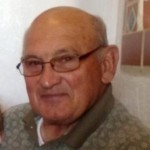 If your are from Forsyth, Montana, you most likely know our uncle, Butch Schulenberg. It’s not just because Forsyth is a small town of only 1495 people, so it is easy for everyone to know everyone else, but Butch Schulenberg is really special person within the Forsyth family. For one thing, he grew up the son of the local sheriff, and especially in a small town, that means everyone knows you, and might have even asked for you help when it came to matters of trouble with the sheriff. I doubt if his friends ever got into any real trouble, but kids will be kids. It’s just the way it is. I also doubt if Butch had a lot of pull when it came to getting his friends out of trouble, but then Sheriff Andy Schulenberg had a very different style when it came to policing the people of Rosebud County Montana. He didn’t even carry a gun, but that’s another story.
If your are from Forsyth, Montana, you most likely know our uncle, Butch Schulenberg. It’s not just because Forsyth is a small town of only 1495 people, so it is easy for everyone to know everyone else, but Butch Schulenberg is really special person within the Forsyth family. For one thing, he grew up the son of the local sheriff, and especially in a small town, that means everyone knows you, and might have even asked for you help when it came to matters of trouble with the sheriff. I doubt if his friends ever got into any real trouble, but kids will be kids. It’s just the way it is. I also doubt if Butch had a lot of pull when it came to getting his friends out of trouble, but then Sheriff Andy Schulenberg had a very different style when it came to policing the people of Rosebud County Montana. He didn’t even carry a gun, but that’s another story.
Uncle Butch grew up loving sports, and was a local sports hero. He still actively supports the local teams to this  day. It doesn’t matter to Butch, if it’s the boys teams, the girls teams, or the little league teams. They are his teams and he is a very loyal man. Knowing so many f the town’s people helps too, because he knows these kids personally. He has watched them grow up and cheered them on in every endeavor. You can’t beat the blessing of knowing all those great kids, and having them know you too. Butch never met a stranger, and calls everyone his friend. I like that, because while he is my husband, Bob Schulenberg’s uncle, he is mine too, by marriage. Nevertheless, I don’t even consider the “by marriage” part, because Butch Schulenberg is my uncle just as if I had been born into the family, and I love him very much. He even cheers me on
day. It doesn’t matter to Butch, if it’s the boys teams, the girls teams, or the little league teams. They are his teams and he is a very loyal man. Knowing so many f the town’s people helps too, because he knows these kids personally. He has watched them grow up and cheered them on in every endeavor. You can’t beat the blessing of knowing all those great kids, and having them know you too. Butch never met a stranger, and calls everyone his friend. I like that, because while he is my husband, Bob Schulenberg’s uncle, he is mine too, by marriage. Nevertheless, I don’t even consider the “by marriage” part, because Butch Schulenberg is my uncle just as if I had been born into the family, and I love him very much. He even cheers me on  in my writing endeavors, and that pleases me very much. Butch is like…everybody’s cheerleader. He loves to see people succeed and loves to cheer them on to that success.
in my writing endeavors, and that pleases me very much. Butch is like…everybody’s cheerleader. He loves to see people succeed and loves to cheer them on to that success.
Butch is also a proud husband, father, and grandfather. His kids, Tadd, Andi Kay, and Heath have 7 children between, and they all love their grandpa very much. Like the kids of Forsyth, Butch is one of his grandchildren’s biggest fans. He loves hearing about their activities and attends whenever he can. He tries very hard to be a hands-on grandpa, and they love him very much. Today is Uncle Butch’s 81st birthday. Happy birthday Uncle Butch. Have a great day!! We love you!!
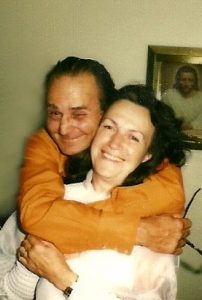
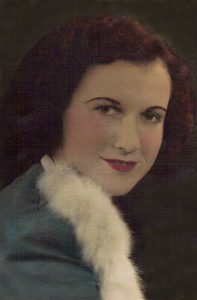 We always loved having my Aunt Ruth and Uncle Jim Wolfe come to town for visits. They were funl-oving people who always kept things lively and kept us laughing. They usually came with their three kids, Shirley Cameron, Larry Wolfe (who passed away in 1976), and Terry Wolfe. Sometimes they came with friends of Larry and Terrys, or with Shirley’s husband Wayne “Shorty” Cameron, Tonnya Cameron, and Larry Cameron. When the kids were there, it was especially fun. The boys were rowdy and rambunctious. And while there war no way my sisters and I could have “taken” them, that didn’t stop us from trying, or them from pretending that we might win the battle. The boys “style” was exactly the same as Aunt Ruth’s. The whole family was a barrel of laughs, and I miss those who have gone home to Heaven very much.
We always loved having my Aunt Ruth and Uncle Jim Wolfe come to town for visits. They were funl-oving people who always kept things lively and kept us laughing. They usually came with their three kids, Shirley Cameron, Larry Wolfe (who passed away in 1976), and Terry Wolfe. Sometimes they came with friends of Larry and Terrys, or with Shirley’s husband Wayne “Shorty” Cameron, Tonnya Cameron, and Larry Cameron. When the kids were there, it was especially fun. The boys were rowdy and rambunctious. And while there war no way my sisters and I could have “taken” them, that didn’t stop us from trying, or them from pretending that we might win the battle. The boys “style” was exactly the same as Aunt Ruth’s. The whole family was a barrel of laughs, and I miss those who have gone home to Heaven very much.
Aunt Ruth was a talented musician, and could play any instrument she picked up. That was a favorite memory of her daughter Shirley’s. She loved that her mom was talented both in music and in art. I really never had any idea that Aunt Ruth was so talented until we visited Shirley and Shorty when her dad, Uncle Jim passed away. Shirley showed us some of the paintings she had done. Unfortunately, many of Aunt Ruth’s things were lost in a fire that claimed the home she had shared with Uncle Jim. Aunt Ruth had passed away by then, but Uncle Jim stilled lived there, next door to their daughter Shirley and her family. The fire was the point when it became clear that Uncle Jim, who had Alzheimer’s disease by this time, would have to move to a nursing home. It was a sad time for all, because of the lost pictures, paintings, instruments, and most of all, because Shirley could no longer see her dad ever day, because it was just too far to the nursing home where he now lived. Aunt Ruth was also a talented equestrienne, and raced her horses often.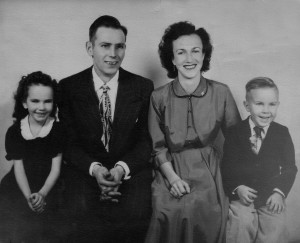
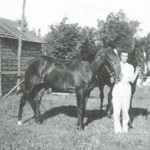
Aunt Ruth passed away at the very early age of just 66 years. She had cancer, and it was a fast-growing type. She found out about it, and before we all could think twice, she was gone. That was such a sad time, and we all miss her very much. Aunt Ruth passed away on May 11, 1992. It is so hard to believe that it has been that long ago. Today would have been Aunt Ruth’s 96th birthday. Happy birthday in Heaven Aunt Ruth. We love and miss you very much.

 Being the oldest child isn’t always the easiest job. My Aunt Evelyn Hushman, my mom’s sister, was born on November 9, 1928…shortly before Black Monday and the beginning of the Great Depression. These were not easy times, and everyone had to pitch in. That isn’t always easy for anyone, but for the oldest child, it means helping to raise all the children born after you are, and when the family has 9 children, that’s eight children that you get to help raise. Granted, Aunt Evelyn was a little young to help much with her sisters, Virginia and Deloris, but she helped a lot more when it came to Larry, Collene (my mom), Wayne, Bonnie, Dixie, and Sandy…who was just three years older than her first niece, Sheila “Susie” Young. At that point, the cycle came back around, and some of the younger children got to help raise their nieces and nephews.
Being the oldest child isn’t always the easiest job. My Aunt Evelyn Hushman, my mom’s sister, was born on November 9, 1928…shortly before Black Monday and the beginning of the Great Depression. These were not easy times, and everyone had to pitch in. That isn’t always easy for anyone, but for the oldest child, it means helping to raise all the children born after you are, and when the family has 9 children, that’s eight children that you get to help raise. Granted, Aunt Evelyn was a little young to help much with her sisters, Virginia and Deloris, but she helped a lot more when it came to Larry, Collene (my mom), Wayne, Bonnie, Dixie, and Sandy…who was just three years older than her first niece, Sheila “Susie” Young. At that point, the cycle came back around, and some of the younger children got to help raise their nieces and nephews.
Aunt Evelyn loved getting together with friends, and even her siblings. She and Uncle George often double dated with my parents, and they later bowled together for years. Aunt Evelyn was a very social person, and loved gatherings. I remember the whole Hushman family coming to celebrate my mom’s birthday, which was on New Year’s Day, hence the New Year’s Eve party. We always had such a great time when the Hushman family joined in the parties, and I really miss those days very much. Because it was Mom’s birthday party, all the kids were welcome, and sometimes I wonder if our parents were half crazy having at least ten kids in the house at one time, and mind you, it was too cold to play outside, because it was after all, the middle of winter. Still, a great time was had by all.

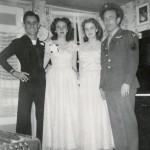
My parents, Aunt Evelyn, and Uncle George also bowled together every Thursday night. They had a great time. I don’t remember what kind of averages they all had but I think they were pretty good bowlers. They loved spending time together, and bowling was a great way to do that. They were good friends all of their lives, and I know my mom couldn’t stand the idea of living without her big sister. Mom loved her so very much. I’m thankful they are together again in Heaven. Today would have been Aunt Evelyn’s 93rd birthday. Happy birthday in Heaven Aunt Evelyn. We love and miss you very much.
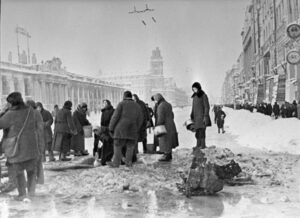
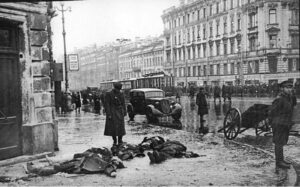 In reality, they gave science a bad name. The calculations made by German scientists before the invasion of Leningrad was launched in September of 1941, estimated that as many as 30 million Russian civilians would succumb to starvation. Hitler’s plan was to annihilate the Russian population and establish new German colonies in Eastern Europe. Hitler had a very specific idea of “the perfect race” and he would stop at nothing to achieve his goal.
In reality, they gave science a bad name. The calculations made by German scientists before the invasion of Leningrad was launched in September of 1941, estimated that as many as 30 million Russian civilians would succumb to starvation. Hitler’s plan was to annihilate the Russian population and establish new German colonies in Eastern Europe. Hitler had a very specific idea of “the perfect race” and he would stop at nothing to achieve his goal.
The people of Leningrad would experience Hitler’s cold German indifference to suffering firsthand. I suppose “German indifference” isn’t totally fair, because many of the German people were against the cruelty Hitler was so comfortable with. When the city was surrounded by September 1941, the Axis forces chose not to close in and engage in costly urban fighting, but to pound Leningrad from a safe distance and let hunger do the rest. They planned to block all transportation of vehicles in and out of the city, until all food ran out, and the people died from starvation.
Hitler’s plan left out one thing…a Surrender Option. The people could not surrender and live. They wanted then to die, and that was going to be their only option. Hitler’s direct order was to ignore the offer to surrender, saying “Requests for surrender resulting from the city’s encirclement will be denied, since the problem of relocating and feeding the population cannot and should not be solved by us.”
Hitler was ruthless. The city’s water and food supplies were cut off, and extreme famine soon set in. The siege of Leningrad began on September 8, 1941, and ended after a grueling two-year period on January 27, 1944. Yes, the siege produced starvation and disease, but Hitler took it a step further…to psychological torment. On Hitler’s orders, Leningrad suffered a daily barrage of artillery attacks from the German and Finnish forces that encircled it. The people were already starving, and lack of food or drink for long periods of time, can make something like an artillery attack, be that much more unsettling…even to the point of more than terror. They are dealing with gnawing hunger, and the terror of wondering if the artillery will hit them, and they should be, because Hitler would not care if he hit a civilian, accidently or on purpose. The people had no recourse, and no way out. After 872 days of starvation, disease, and the artillery attacks, the citizens of Leningrad…the ones who 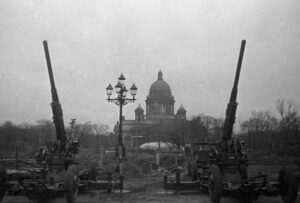
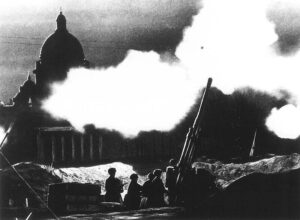 were left anyway, were freed, but to what. Their city had been overtaken, many had family members who had died, their businesses were gone, their homes were gone…they had lost it all. In total, roughly 1.5 million people were killed during the siege of Leningrad while some 1.4 million were evacuated. I’m sure Hitler was still disappointed with the outcome, because he wanted them all dead.
were left anyway, were freed, but to what. Their city had been overtaken, many had family members who had died, their businesses were gone, their homes were gone…they had lost it all. In total, roughly 1.5 million people were killed during the siege of Leningrad while some 1.4 million were evacuated. I’m sure Hitler was still disappointed with the outcome, because he wanted them all dead.

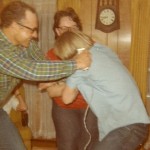 Uncle Eddie Hein was a soft-spoken man, but that didn’t mean that he wasn’t a funny man. He loved to laugh, and he had a great laugh too. That is probably one of the things I miss most about Uncle Eddie…that and the great smile that went with the great laugh. He loved practical jokes…like pretending to give my husband, Bob Schulenberg, his nephew, a buzzcut in the 70s, when long hair was the style. I think Bob knew that the clippers weren’t plugged in, but he went along with the joke anyway. It is my guess that my in-laws, Walt and Joann Schulenberg put Eddie up to the joke, almost hoping he would actually cut Bob’s hair. Of course, Eddie would never have done that, but it was a funny thought anyway. It was a typical kind of joke Eddie would pull on people.
Uncle Eddie Hein was a soft-spoken man, but that didn’t mean that he wasn’t a funny man. He loved to laugh, and he had a great laugh too. That is probably one of the things I miss most about Uncle Eddie…that and the great smile that went with the great laugh. He loved practical jokes…like pretending to give my husband, Bob Schulenberg, his nephew, a buzzcut in the 70s, when long hair was the style. I think Bob knew that the clippers weren’t plugged in, but he went along with the joke anyway. It is my guess that my in-laws, Walt and Joann Schulenberg put Eddie up to the joke, almost hoping he would actually cut Bob’s hair. Of course, Eddie would never have done that, but it was a funny thought anyway. It was a typical kind of joke Eddie would pull on people.
Eddie is my father-in-law, Walt Schulenberg’s half brother, and so it was an annual trip from Casper, Wyoming to Forsyth, Montana that the Schulenberg’s took each year, to keep the family close to the aunt, uncles, and cousins that lived there, as well as to my father-in-law’s mom, Vina Hein, and step-dad, Walt Hein. When Bob and I got married, we wanted to continue that tradition, and I have always been glad we did. My girls had the privilege of knowing some of the most amazing people through those trips. I have always believed in the importance of family, and have hopefully instilled those same traditions on my kids and grandkids.
Eddie was a hard-working man, who worked hard in the coal mines, and then came home to work hard around the home he shared with his wife, Pearl, and children, Larry and Kim. He turned their smaller mobile home into a very nice house, with plenty of room for the whole family. He and Pearl also raised a wonderful garden, and canned lots and lots of vegetables. That garden saved the family lots of money in grocery bills. Canning I could do, but gardening…not so much, so I don’t mind telling you that I was a little bit jealous of those who can grow gardens, vegetable or flower.
Eddie was a mechanic by trade, and never really wanted to be a rancher, although he could do that work too. I think Eddie could do anything he put his mind to. He was a very talented Jack of all Trades. The Forsyth area is abundant in river rock, because of the Yellowstone River that flows through town. Eddie built a beautiful 
 fireplace in their home out of that river rock. It was just stunning, and one of my favorite parts of the home he built. It not only heated the home, but it made it look amazing too. Eddie also helped my father-in-law when he was building the house he built in the Casper area.
fireplace in their home out of that river rock. It was just stunning, and one of my favorite parts of the home he built. It not only heated the home, but it made it look amazing too. Eddie also helped my father-in-law when he was building the house he built in the Casper area.
Eddie went home to be with the Lord on October 16, 2019, and we all miss him very much. In my mind’s eye, I can still visualize his smiling face and his great laugh. Today would have been Uncle Eddies 78th birthday. Happy birthday in Heaven, Uncle Eddie. We love and miss you very much.
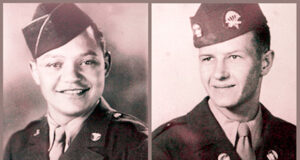 There were a number of events that took place on June 6, 1944, also known as D-Day. The areas of the Allied attack were miles away from each other. Early that morning, the Allies dropped thousands of allied paratroopers behind enemy lines in anticipation of the invasion of Normandy. It seems a strange idea to drop them behind enemy lines…like it was a big mistake. Nevertheless, one of the main objectives of the 101st Airborne was to capture the small village of Angoville-au-Plain. Then, when intense fighting broke out over the village, they dropped two American medics, Robert Wright and Kenneth Moore, in to set up a medical station in the tiny town
There were a number of events that took place on June 6, 1944, also known as D-Day. The areas of the Allied attack were miles away from each other. Early that morning, the Allies dropped thousands of allied paratroopers behind enemy lines in anticipation of the invasion of Normandy. It seems a strange idea to drop them behind enemy lines…like it was a big mistake. Nevertheless, one of the main objectives of the 101st Airborne was to capture the small village of Angoville-au-Plain. Then, when intense fighting broke out over the village, they dropped two American medics, Robert Wright and Kenneth Moore, in to set up a medical station in the tiny town  church. So, now they had not only had troops behind the lines, but they have medics…without guns behind the lines too.
church. So, now they had not only had troops behind the lines, but they have medics…without guns behind the lines too.
The plan to take over the village worked quickly and well. United States paratroopers established control of Angoville-au-Plain, but just as quickly, German units counterattacked and forced American troops back. Because of multiple injuries, Wright and Moore stayed behind. Suddenly they found themselves in danger when German soldiers entered the church. At first the German soldiers were hostile to the Americans, but then they realized that the medics were treating their wounded, as well the Allied wounded. The German troops could have attacked the men, and walked away without penalty, but instead, they left, posting a Red Cross flag at the entrance.
The fighting in the area raged on for three days, and the village changed hands several times, but the two medics never missed a beat. Over the course of the three days, they saved 80 lives, including a local teenager. The amazing part of the whole thing wasn’t just that they saved the lives, but also that the German soldiers didn’t kill them  in the first place. I’m sure the medics thought that was an amazing thing. The little village of Angoville-au-Plain thought is was amazing too…not just the work of the medics, but also the work of the 101st Airborne. They thought it was amazing enough to make sure it was remembered
in the first place. I’m sure the medics thought that was an amazing thing. The little village of Angoville-au-Plain thought is was amazing too…not just the work of the medics, but also the work of the 101st Airborne. They thought it was amazing enough to make sure it was remembered
Today, all of the stained glass windows in the church (the originals were destroyed in the battle) are tributes to Wright, Moore, and the 101st Airborne. Wright visited the church in 2004, and some of his ashes were spread in Angoville-au-Plain’s cemetery as per his request, following his death on December 21, 2013. Moore passed away on December 7, 2014.
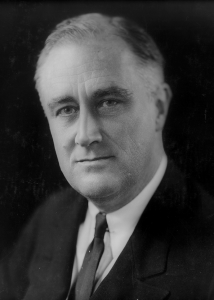 Most people believe that a there was always a two term limit on the office of the President of the United States, but that wasn’t always so. On November 5, 1940 Franklin D Roosevelt broke a long-held precedent, but not a law. The precedent was one that started with George Washington, when he became the first president elected to a third term. Roosevelt would go on to vie for, and win a fourth term, taking office again on January 20, 1945.
Most people believe that a there was always a two term limit on the office of the President of the United States, but that wasn’t always so. On November 5, 1940 Franklin D Roosevelt broke a long-held precedent, but not a law. The precedent was one that started with George Washington, when he became the first president elected to a third term. Roosevelt would go on to vie for, and win a fourth term, taking office again on January 20, 1945.
Roosevelt was the first president to win four terms, and the last president to win more than two consecutive presidential elections. His exclusive four terms were in part a consequence of timing. His election for a third term took place as the United States remained in the throws of the Great Depression and World War II had just begun. FDR (as he was known) was not the first president to try for multiple terms, but the instability of the times allowed him to make a strong case for stability…and how he, alone, could make that happen.
Says Barbara Perry, professor and director of presidential studies at the University of Virginia’s Miller Center, “You have economic-domestic issues and you have foreign policy with the outbreak of World War II in 1939. And then you have his own political viability—he had won the 1936 election with more than two-thirds of the popular vote.” It wasn’t that FDR’s policies were necessarily good for the country, and in fact, it is my opinion that most were disastrous, but since I was not born during FDR’s time in office, I suppose my only proof is history, and there are two sides to every story. All we can do is to look back at just how long it took to pull this nation out of the Great Depression, and draw our own conclusion from there. Anytime economic policies bring about big government, they hurt the American people.
The fact remains that any politician who is in office too long is a danger to this nation. I believe that we need to have term limits in every office there is. When a politician is in office too long, they begin to act like a dictator, and think that they don’t have to answer to anyone. Too much power in any one person’s hands creates greed and evil. Eventually, the United States lawmakers began to argue that term limits were necessary to keep abuse of power in check. FDR passed away on April 12, 1945, less than 3 months into his fourth term. Two years after FDR’s death, Congress passed the 22nd Amendment, limiting presidents to two terms. Then amendment was then ratified in 1951. At the time of FDR’s third presidential run, however, “There was nothing but precedent standing in his way, but, still, precedent, especially as it relates to the presidency, can be pretty powerful,” said Perry. A third consecutive run had been tried by other presidents, but they had failed. People really don’t want that.
The idea of needing term limits was not found among the framers of the Constitution, most of whom did not see the need. I’m sure they never considered man’s ability to be greedy and power-hungry, but Washington saw the importance, thus the precedent in not seeking re-election for a third time. Still, some had tried.  Ulysses S Grant lost a third campaign in 1880, when James Garfield clinched the Republican nomination. Theodore Roosevelt lost his bid at a third nonconsecutive term in 1912 to William Howard Taft (he had previously served out the remainder of President William McKinley’s term and then won reelection). And Woodrow Wilson lost the Democratic nomination in 1920. Harry Truman, who succeeded FDR after his death, was president when the 22nd Amendment passed and so was exempt from the new rule. Truman campaigned for a third term in 1952, but withdrew after losing in the New Hampshire primary. Roosevelt’s campaign for a third term took place as the United States had not yet entered World War II, and the president was still trying to hold the line in an isolationist pattern…another of his disastrous policies. And just one more reason to make term limits in all public offices mandatory.
Ulysses S Grant lost a third campaign in 1880, when James Garfield clinched the Republican nomination. Theodore Roosevelt lost his bid at a third nonconsecutive term in 1912 to William Howard Taft (he had previously served out the remainder of President William McKinley’s term and then won reelection). And Woodrow Wilson lost the Democratic nomination in 1920. Harry Truman, who succeeded FDR after his death, was president when the 22nd Amendment passed and so was exempt from the new rule. Truman campaigned for a third term in 1952, but withdrew after losing in the New Hampshire primary. Roosevelt’s campaign for a third term took place as the United States had not yet entered World War II, and the president was still trying to hold the line in an isolationist pattern…another of his disastrous policies. And just one more reason to make term limits in all public offices mandatory.
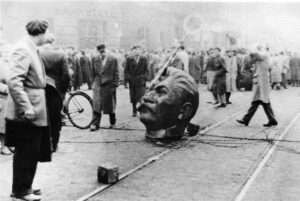 Those who support Socialism, Marxism, and Communism have simply never lived under these forms of government, or they are a part of the upper echelon of such a government. People who have been forced to live under these types of government, will ultimately try to find a way of escape or will participate in a national uprising, such as the one that happened in Hungary in 1956.
Those who support Socialism, Marxism, and Communism have simply never lived under these forms of government, or they are a part of the upper echelon of such a government. People who have been forced to live under these types of government, will ultimately try to find a way of escape or will participate in a national uprising, such as the one that happened in Hungary in 1956.
Sadly, by the time the people realize that they are in serious trouble, the government often has such a chokehold on the nation that the only way out if to have an uprising. Nevertheless, people will eventually fight for their rights, or fight to escape. While the uprising in Hungary began in October 1956, when thousands of protesters took to the streets demanding a more democratic political system and freedom from Soviet oppression, the real problem started long before that. It started when the Communist Party took over and began to systematically take away the rights of the people. There were a few people within the party who could see through the Communist Party’s ideas. When party officials appointed Imre Nagy, a former premier who had been dismissed from the party for his criticisms of Stalinist policies, as the new premier, he began to try to restore peace and asked the Soviets to withdraw their troops. The Soviets did so, but Nagy then tried to push the Hungarian revolt forward by abolishing one-party rule. He also announced that Hungary was withdrawing from the Warsaw Pact (the Soviet bloc’s equivalent of NATO).
This forced the hand of the Soviet government. On November 4, 1956, Soviet tanks rolled into Budapest to 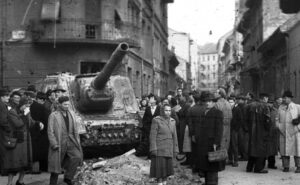 crush the national uprising, once and for all. Te fighting in the streets was vicious, but the Soviets’ greater power ensured their victory. The people had long been stripped of their weapons, and anything else that might have helped the achieve victory. At 5:20am Hungarian Prime Minister Imre Nagy announced the invasion to the nation in a grim, 35-second broadcast, declaring: “Our troops are fighting. The Government is in place.” He tried to reassure the people and keep hope alive, but within hours, Nagy sought asylum at the Yugoslav Embassy in Budapest. He was captured shortly thereafter and executed two years later. Nagy’s former colleague and imminent replacement, János Kádár, who had been flown secretly from Moscow to the city of Szolnok, 60 miles southeast of the capital, prepared to take power with Moscow’s backing. The conspiracy was complete, and the people had been betrayed…even their leader.
crush the national uprising, once and for all. Te fighting in the streets was vicious, but the Soviets’ greater power ensured their victory. The people had long been stripped of their weapons, and anything else that might have helped the achieve victory. At 5:20am Hungarian Prime Minister Imre Nagy announced the invasion to the nation in a grim, 35-second broadcast, declaring: “Our troops are fighting. The Government is in place.” He tried to reassure the people and keep hope alive, but within hours, Nagy sought asylum at the Yugoslav Embassy in Budapest. He was captured shortly thereafter and executed two years later. Nagy’s former colleague and imminent replacement, János Kádár, who had been flown secretly from Moscow to the city of Szolnok, 60 miles southeast of the capital, prepared to take power with Moscow’s backing. The conspiracy was complete, and the people had been betrayed…even their leader.
The people of the West were stunned by the Soviet action. Soviet leader Nikita Khrushchev had promised to retreat from the Stalinist policies and repression of the past, but the violent actions in Budapest told of a different plan. An out of control government will always chose its own greedy ways over the good of the people it is supposed to serve. On that day, an estimated 2,500 Hungarians died and 200,000 more fled as refugees. Sporadic armed resistance, strikes, and mass arrests continued for months thereafter, causing substantial economic disruption. The spontaneous national uprising that began 12 days before in Hungary was viciously crushed by Soviet tanks and troops on November 4, 1956.
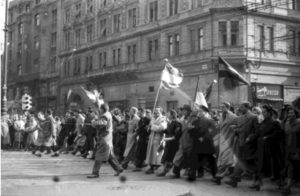
Many Hungarians were angered and frustrated by the inaction on the part of the United States. Voice of America radio broadcasts and speeches by President Dwight D Eisenhower and Secretary of State John Foster Dulles had recently suggested that the United States supported the “liberation” of “captive peoples” in communist nations, but they didn’t see that playing out in their situation. During that time, approximately 30,000 Hungarian refugees were allowed to enter the United States. Yet, as Soviet tanks bore down on the protesters, the United States did nothing beyond issuing public statements of sympathy for their plight.
 Politics is always a dirty game. That is probably why most of us don’t like career politicians. They will do or say anything to win or further their careers. “Dirty politics” has been around as long as there have been politicians…and politics isn’t even limited to just politicians. There’s office politics, military politics, law enforcement politics, and more.
Politics is always a dirty game. That is probably why most of us don’t like career politicians. They will do or say anything to win or further their careers. “Dirty politics” has been around as long as there have been politicians…and politics isn’t even limited to just politicians. There’s office politics, military politics, law enforcement politics, and more.
General George Washington wasn’t even exempt. In October 1777, while serving as the commander of the Continental Army, Washington was informed of a conspiracy to discredit him with Congress and have him replaced by General Horatio Gates. The loosely organized attempt was supposedly led by Brigadier General Thomas Conway, who was an Irish member of the French army. Conway commanded a brigade in Washington’s army, and he was unhappy with Washington’s performance in the Battle of Brandywine. Conway was also bragging about his own feats at the same operation. Conway was even so bold as to request a promotion for himself, to the rank of major general…based on the merits of his “performance” in the battle. Washington protested Conway’s promotion and was irritated by the request, believing it would have disastrous effects on the morale of more senior officers. I think the biggest problem was the arrogance of Conway. It just isn’t right to brag on yourslf so much.
Thomas Conway, would be made inspector general of the United States less than two months later on December 14, but it is my belief that it was in an effort to pigeon-hole hime, because he was an embarrassment. Conway, was born in Ireland, but raised in France. He entered the French army in 1749. Silas Deane, the American ambassador to France, recruited Conway to the Patriot cause. Conway met with Washington at Morristown in May 1777, after which, he was appointed brigadier general and assigned to Major General John Sullivan’s division. Conway served admirably under Sullivan at the battles of Brandywine, in September 1777, and Germantown, in October 1777, before becoming involved in an unconfirmed conspiracy to remove General Washington from command of the Continental Army. It ruined his military career.

Conway wasn’t alone in the cabal. The Continental Army had suffered several defeats in the fall of 1777, and some members of Congress felt it was Washington’s leadership that was to blame. Conway began writing letters to prominent leaders, including General Horatio Gates, that were critical of Washington. After Washington got wind of Conway’s letter to General Gates, he wrote his own letter to Congress in January 1778. Conway was embarrassed, and in March 1778, he offered his resignation as an apology. Nevertheless, he was surprised and humiliated when Congress accepted. After General John Cadwalader wounded him in a duel defending Washington’s honor, Conway returned to France, where he died in exile in 1800…unable to recover his dignity after the horrific Conway Cabal.

